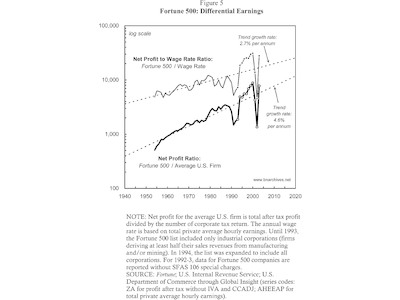Elementary Particles of the Capitalist Mode of Power
Bichler, Shimshon and Nitzan, Jonathan.
(2006).
Paper read at Sixth International Conference of Rethinking Marxism. University of Massachusetts, Amherst. October. pp. 1-20.
(Conference Paper / Proceedings; English).
Preview |
PDF (Transcript)
20061027_bn_elementary_particles_rm_transcribed.pdf Download (566kB) | Preview |
|
Other (Excel data for the figures)
20061027_bn_elementary_particles_rm_data.xls Download (27kB) |
|
![[thumbnail of Figure 1 - JPG]](/215/3.hassmallThumbnailVersion/20061027_bn_elementary_particles_rm_transcribed_figure1.jpg)  Preview |
Other (Figure 1 - JPG)
20061027_bn_elementary_particles_rm_transcribed_figure1.jpg Download (689kB) | Preview |
![[thumbnail of Figure 2 - JPG]](/215/4.hassmallThumbnailVersion/20061027_bn_elementary_particles_rm_transcribed_figure2.jpg)  Preview |
Other (Figure 2 - JPG)
20061027_bn_elementary_particles_rm_transcribed_figure2.jpg Download (883kB) | Preview |
![[thumbnail of Figure 3 - JPG]](/215/5.hassmallThumbnailVersion/20061027_bn_elementary_particles_rm_transcribed_figure3.jpg)  Preview |
Other (Figure 3 - JPG)
20061027_bn_elementary_particles_rm_transcribed_figure3.jpg Download (584kB) | Preview |
![[thumbnail of Figure 5 - JPG]](/215/6.hassmallThumbnailVersion/20061027_bn_elementary_particles_rm_transcribed_figure4.jpg)  Preview |
Other (Figure 5 - JPG)
20061027_bn_elementary_particles_rm_transcribed_figure4.jpg Download (439kB) | Preview |
![[thumbnail of Figure 6 - JPG]](/215/7.hassmallThumbnailVersion/20061027_bn_elementary_particles_rm_transcribed_figure5.jpg)  Preview |
Other (Figure 6 - JPG)
20061027_bn_elementary_particles_rm_transcribed_figure5.jpg Download (727kB) | Preview |
Abstract or Brief Description
Theories of society, as of nature, are characterized by their elementary particles. The elementary particle of neoclassical economics is the util. The elementary particle of classical Marxism is abstract labour. These elementary particles represent material quanta. They are deemed useful because both neoclassical economics and classical Marxism analyze capitalism as a mode of production and consumption. In this paper we offer a different approach. We argue that, most broadly, capitalism should be seen not as a mode of production, but a mode of power. From a viewpoint of power, utils and abstract labour are useless. They represent absolute magnitudes, whereas power is inherently relative. To understand the capitalist mode of power we need new elementary particles. The basic unit of analysis we begin with is differential capitalization. Capitalization represents the present value of expected future earnings (ex-post future earnings modified by investors’ hype), which in turn are corrected for risk perceptions and discounted by the normal rate of return. Differential capitalization benchmarks the capitalization of any owner or group of owners against the average owner. The paper begins by exploring the four elementary particles that comprise differential accumulation – future earnings, hype, risk and the normal rate of return. It concludes by assessing the implications of this new framework of differential capitalization for understanding the capitalist mode of power.
Language
EnglishPublication Type
Conference Paper / ProceedingsKeywords
capital capitalization hype labour Marxism neoclassical economics normal rate of return risk power profit utility valueSubject
BN Civilization & Social SystemsBN Theory
BN Data & Statistics
BN Cooperation & Collective Action
BN Institutions
BN Power
BN Region - North America
BN Business Enterprise
BN Value & Price
BN Production
BN Conflict & Violence
BN Money & Finance
BN Ideology
BN Distribution
BN Methodology
BN Capital & Accumulation
BN Time
Depositing User
Jonathan NitzanDate Deposited
22 Jun 2007Last Modified
29 Jul 2025 20:41URL:
https://bnarchives.net/id/eprint/215Actions (login required)
 |
View Item |
